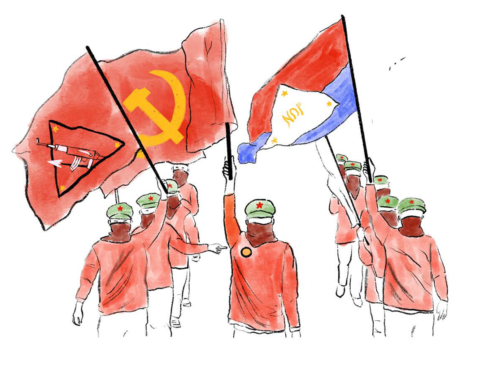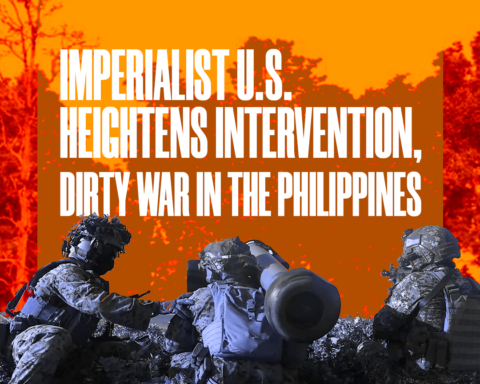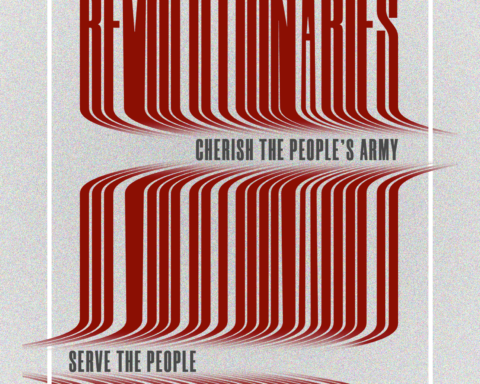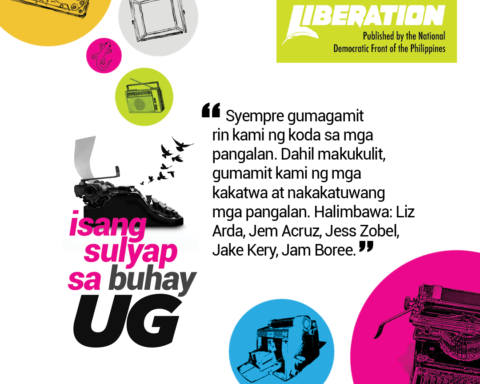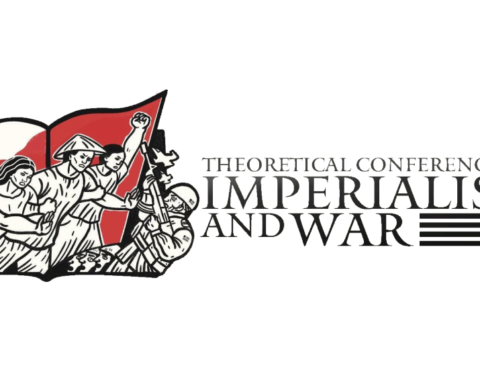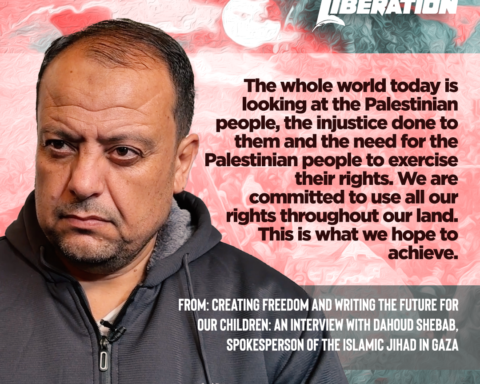by the Liberation Staff
Family and school life. Aspirations and life in the struggle. An afternoon with Ka Rio in a guerrilla zone. Listen to this millennial who has defied the norms of a petrified society to bloom and become another hope of the motherland. (The interview was originally published in Filipino.)
Liberation (L): When did you become an activist?
Ka Rio (KR): I first got organized when I was a college sophomore in a local state university. That was at the height of the campaign against tuition fee increase. Dahil pabibo, e di join-join ako. (Because I wanted to be everywhere, I joined). You know, the typical adventurous youth. I gathered signatures for the petition against tuition fee increase. The petition helped the students pursue their fight. And we were able to stop the school’s plan. But I wasn’t consistent then. There were times when I did not join student activities. There was a gap.
But when I joined an environmental investigative mission in one of the provinces beset with a problem on mining, I got agitated. At first, the adventurous me joined because the area was by the seaside. But when I got there, I began to ask questions. Why are the people poor—the peasants, the fisherfolk—when we have these rich resources in the country? From then on there was no stopping. The following Christmas, I went to a community of indigenous people for gift-giving.
L: Were you already a KM (Kabataang Makabayan) member at that time?
KR: Not yet. (Laughter) I was an eternal KK (Kandidatong Kontak, candidate contact, a term used to those who are long-time activists but were not recruited into the KM). It took some more months before I became a KM member. But after I came in, no one could stop me. I joined RTR (room-to-room) recruitment and ED (educational discussions) with the students.
A month after I became a KM member, I attended study sessions in a guerrilla zone. I took up the MKLRP (Maikling Kurso sa Lipunan at Rebolusyong Pilipino, a condensed course on Philippine society and revolution).
L: How was your studies after you became an activist?
KR: I attended my classes. Then, the rest of the time, I was in other colleges talking to students, recruiting among them. I did my tasks in the movement simultaneous with my studies. Because I was guided by the principles of Marxism-Leninism-Maoism (MLM), I was able to do it. I applied these same principles to my studies, resulting in a much broader and sharper analysis of my school work.
I was a consistent college scholar. I did not pay tuition fees. My mother tolerated my activism because I did not neglect my studies. Even during exams, I continued with my activities outside the school. I went to different provinces. There were times I would ask my professors to excuse me from the exams because I needed to attend to other activities. Since I was a diligent student, they trusted me and granted me permission. I took the exams after the activities. At the time, I was also the president of an academic organization in our school.
L: What course did you take up?
KR: AB Psychology. Once, our academic organization sponsored a “pajama” party which coincided with KM’s study session. Since I was the president of the organization, I could not attend the ED. (Laughter.) I missed the opportunity.
L: Didn’t your teachers or classmates warn you from becoming an activist?
KR: There was a time when many students from our school joined the New People’s Army (NPA), so they assumed my organization was an activist organization and a recruiter for the red army. They did not tell me not to join but only cautioned me, ingat (keep safe) they said. OK!
L: You were a scholar. How did you balance your studies and your activism?
KR: I could set aside my studies every now and then and return to it after the activities. Activism did not keep me from studying. Or should I say my studies did not hinder my activism. Nothing can keep you from fighting if you have the will and commitment to serve the students and the masses.
In my fourth year, I became the chairperson of a university-wide organization. That required much of my time. It was also the time when we had to campaign again against tuition fee increase—explaining to students that the school’s budget should not burden them… chu chu… that it was the government’s responsibility. That! So we had another round of petition signing, recruitment, ED, RTR propaganda.
I was able to do all those while studying and working on my thesis and on my OJT (On-the-Job Training, a graduation requirement). My OJT was thrice a week but in between I still went to school for the campaign, recruitment, and ED. When I think about it, bongga lang (top-notch). Tumbling! Lagare (literally, a saw; a term used to describe one’s tight schedule and activities).
L: How did activism affect your studies?
KR: Before I became an activist, I was a careerist. My goal was to graduate with laude—cum laude. That! So, I had to maintain my high grades. I had to be a consistent college scholar.
When I became an activist, I got higher grades. I became a university scholar. So, activism is not a hindrance. Actually, it helps you broaden your understanding of things. And you become more intelligent in class, hahaha! It’s true! Because you are no longer confined in just the four walls of the classroom. I applied to my course the theories I learned from the movement, especially because my course is psychology—how society affects the thinking of a person. Eme! That!
L: You graduated cum laude, did your parents convince you to work?
KR: After graduation, I did not go home right away. I immediately reported for work in the movement. My mother asked me to come home for a graduation party but I begged off. My high school friends, some of whom also graduated with honors, also wanted a party. But, I only went home months later. The food reserved for me was already spoiled! (Laughter.)
L: What did you do after your graduation? Where did you go?
KR: I went to a community during the school vacation. When classes resumed, I went back to my school-based activities but I requested my collective not to deploy me in my alma mater because the dean and the professors knew me. Besides, I heard the Office of Student Affairs (OSA) comment that I did not deserve to graduate cum laude because I was an activist chuva chuva. That! Bitter! (Laughter.)
L: When did you join the people’s army? How did you prepare for it?
KR: I had spent two years with a youth organization before I went to the countryside. How I joined the NPA was a comedy. I went to a guerrilla zone only to “meet-and-greet” the people’s army. I was just a ‘joiner”. It wasn’t even for a TOD (tour-of-duty). But when I sat in the orientation on the NPA for the new KM members, I was most affected. So I stayed behind. (Laughter.)
We had an educational festival at the camp that time. One of my companions wanted to join the army. But because he was only 16, he was not qualified. I was touched that at 16 he was ready to join the army while it has never even dawned on me. And I was already 22! I felt ashamed of myself.
Then, there was this military cadre, a peasant, who had difficulty reading. On my way to my tent, I passed by him and he was reading aloud, slowly and in syllables “Da-pat pag-a-ra-lan (What need to be learned).” He was in his senior years. “Ano ba yan! (What’s this!)” Again, I was touched and told myself, “Stay here, teh! (teh is from the word “Ate” used to refer to an elder sister but has now become an expression used among peers). That was it! You see, this man was such a good military cadre yet he still wanted to read so he could study and hone his tactics in warfare to better serve the people. I told myself, “What are you doing, you’re a college graduate!” (Laughter.)
L: Was it in your plan to join the army?
KR: I didn’t plan to stay behind. It was my companion who was on TOD. I still wanted to study medicine. That was my dream. I had already borrowed a reviewer for the entrance exam in a medical school. My mother knew about it. I also told the people at the camp I wanted to be a doctor. “Then be a doctor here,” they told me. That made sense. Because around seven of 10 sick people in the countryside had not even seen a doctor before they died. It’s such an ordeal for the masses to travel long distance to see a doctor. Some of them die on the road.
I also realized that if I became a doctor I could only serve those who could afford it. So, I stayed for a month. But even before the month ended, I already said I wanted to be fulltime in the NPA. Aside from the “pressure” from comrades, hahaha, the eklavu of comrades that “gusto nga nating baguhin yung chuva chuva (“we want to change), it was my own
L: Joining the army is a difficult decision especially for someone like you. But it’s even more difficult to persist. How was your more than a year in the NPA?
KR: Actually, wait, where’s my English. Handkerchief, please! (Laughter.)
Well, I am now one year and three months in the army. Of course, life in the NPA is not always fun. It is coupled with sacrifice, loneliness, longing for family, and, yes, for the food out there. Char! (Laughter.) There should always be food in my bag. Even if I don’t eat them as long as I see them, it’s enough morale booster. It’s like go girl, you still have some food here! Hahaha!
The hardest part is not about the long treks but one’s morale. Mao has said courage stems from one’s consciousness. We have to feed our consciousness, raise our ideological level to overcome hardships. On our consciousness anchors our goal, our principles, our will to fight. I find my strength when I read documents like “I Engage” or the “Diary of Tuy” of Vietnam. You can actually do anything as long as you have the will.
L: How do you overcome the physical strain, especially for a woman like you?
KR: Of course, I am capable because… I am big, hahaha! The ascents are indeed back-breaking especially because I have a pack and an armalite. But the comrades will never leave you, they are always there to help. They even carry your backpack if they see you are having a hard time. They help you overcome your difficulties. That’s it!
As a woman, it’s a hassle during rainy season. Also it’s hard not to be able to take a bath. Menstrual period is another burden. But over time, you’ll get used to it. Before, I could not even put up a clothesline for my wet clothes. Like, 30 minutes would pass, my shoulder numbed, and I wasn’t done with the clothesline yet. After a month, I could easily pitch even my tent.
When I came here, I brought along some wipes (wet tissues, used to cleanse after defecating) for a month’s supply. But as days passed, and as the wipes were consumed, I slowly learned to use plant leaves as substitute. Now I know that banana leaves are the softest and the best.
L: How many women are there in your unit?
KR: Less than 10; two are married and one of them has a child. If we include the other units, there are 20 in all—an undersized platoon. We are a mix of petty bourgeois from the cities and local folk. Majority are from the youth sector.
L: What were your other trying moments?
KR: Perhaps the long walks. I am still adjusting to this, especially when it rains and we pass through muddy paths, where at times the mud is up to my knees. There were also times when we can’t turn on our flashlights because the enemy is around.
We had this two weeks of food shortage. We only had galyang (a rootcrop) for rice and another part of galyang for viand. We mashed them together. Even the salt was already wet. I asked myself, “What have I gotten myself into?” Then there was also a time when there was really no rice, no coffee, no sugar. There was really no food supply. The enemies blocked the entry of supplies that even the food of the masses were not allowed. In fact, the soldiers urged the masses to leave the barrios supposedly to prevent them from bringing food to us.
There was a time, too when we were not able to take a bath for 10 days. There were also instances when we were sweating the whole day, then it would rain. Yet, nobody left the army during those trying times.
L: Have you experienced actual battle? How did you feel?
KR: The time when we had nothing to eat, that was also my first experience with an actual firefight. I wasn’t nervous but the first shot stunned me. At first, we thought a bamboo tree just fell down. But, when we heard the volley of fires, we realized it was no longer just a bamboo tree falling down, hahaha! “Hindi na ‘to kawayan, kaaway na to! Hahaha! Laban na pala ‘yun. (This is no longer a bamboo tree, these are enemies! That was real firefight.)”
Initially, I did not know what to do. I just took my backpack and followed the command. I had a hard time getting to the top of the mountain because of my weight, and the heavy pack and rifle. Presence of mind is important. That’s that!
I’ll tell you something. It is about food again. (Laughter). That time, we only had two unripened bananas for breakfast. But, the two bananas sustained us to face our enemies in a firefight. Dalawang saging ka lang (You’re good for just two bananas)! Hahaha! Our two bananas equaled our enemies.
The battle itself was not that difficult. The retreat was more challenging because a helicopter kept hovering over us. We felt it could see us. As first timers our fear was being shot by a machine gun from above. I am energized just by remembering how we overcame those difficulties.
L: How about when loneliness sneaks in?
KR: I criticize myself for not sharing my problems. I just stay in my hammock, in my hut and stare blankly at anything. I do try hard to open up to comrades now because it’s hard to carry emotional baggages.
Totoo naman, di ba? Mas madaling maglakad na malaya ‘yung isip mo. Kahit nga ‘yung wala kang dala, kapag may mabigat kang iniisip, ang hirap maglakad, di ba? Mahirap makalayo, mahirap makarating sa gusto mong puntahan. (It’s true! It’s easier to move around when your mind is free from worries. When your mind is troubled, it’s difficult to walk even without a pack, to go far, to reach your destination.)
L: What experience is your happiest?
KR: When I witnessed the actual setting up of the people’s government — the election of officials, the charting of plans and the one-year program, and the way they govern the barrio. Recently, I got high with the anti-feudal campaign — how it was planned and how the dialogue between the farmers and the traders resulted in the lowering of loan interests. That’s it! This was the most successful anti-feudal campaign that the army had launched in recent years.
L: How did your parents react when you joined the NPA?
KR: I was home after my graduation, one month before I entered the guerrilla zone and decided to join the red army. After two months in the army, I requested to go home to formally tell my parents that I would go fulltime. The comrades did not allow me. Five months later, I wrote my parents that I had joined the NPA. No reply. (Laughter)
But they later sent word asking me to go home just to dispel people’s suspicion that I had joined the NPA. I told them not to mind them; people would eventually grow tired and lose interest in it.
L: Have they visited you here?
KR: Not yet. They are still afraid.
L: How about you? Have you visited them? What was their reaction?
KR: Recently, I went home with my buddy. My mother cried because I had lost weight. Tears of joy! (Laughter). My buddy told me my mother could not stop crying when they talked “because it is only now that Rio has lost weight.” My buddy kept on laughing.
When we went to market, my mother remarked, “Hala, mangongotong kayo.” (“Hala, you are going to extort.”) I replied, “Hala, is that how you raised me? Did I graduate just to extort? If I wanted to extort, I could have just landed a job. There are more to extort there.” (Laughter) She kept silent.
L: Didn’t they ever reprimand you? The usual thing parents tell their children: “I sent you to school…!”
KR: I never heard any of that. When I asked my father for some pizza, his reply was: “How much would it cost to put up a pizza store? Come home and just sell pizza.” (Laughter) Sell pizza! Haggard! My father knows that food is my weakness. (Laughter). When parents see how decisive and determined their children are in carrying out their work, they eventually support us.
L: How do they support you now?
KR: With food, of course! (Laughter). Once, I “begged” for some groceries. My mother sent me all that I listed down with a note that Papa was waiting for payment. (Laughter). I could not help laughing because now my father no longer asks when I would go home but when I would pay for the groceries. When I went home, my mother and my sister bought me things I needed. My sister even packed my things. Happy! Less worry!
L: How did you prepare them for that?
KR: I did nothing, because I wasn’t even prepared myself, hahaha! It was a surprise for all of us!
When I was not yet a KM member, activists would go to our house. They spent Christmas there. My mother asked me if they were activists and I said no. I truly did not know then if they were activists. I wasn’t aware of what an activist was.
L: Did you explain to them what you were doing?
KR: Yes. I told them about our community immersions, the mining, the semi-feudal exploitation, things like those. I told them my experiences in school. They understood of course because they, too, felt the hardships. They see corruption as a cause of poverty. They just need orientation on the correct line. I just need to inject the prime role of imperialism to help them complete their analysis.
L: Did you also share your experiences here in the guerrilla zone? What was their reaction?
KR: Yes. I sent them a letter but when comrades read the letter I was about to send, they said it was not a letter, “This is ED (short for Educational Discussion).”
My parents reaction? E di mayat! (Fine!) (Laughter) But of course, as parents their usual concern is safety. I told them about the land distribution we do. Papa retorted “but the enemies are hunting you.” I told him our enemies are those who deprived the farmers of land. My father just lapsed into silence and he simply said, “Take care.” They have truly accepted my being here.
L: Love life?
KR: None! (Laughter.)
Once, someone proposed a “program” (a process of courtship within the Party and NPA). I accepted the proposal to see how it will prosper. But, nothing happened. I do not want to enter yet into a relationship. I want to be better in what I do first. Hmm char! But of course, at my age… There was someone I liked. But, haayyy… he went down (left the revolutionary movement).
L: What are the most valuable things you receive from friends in the city?
KR: What’s this, questions in a slumbook? (Laughter). Letters make me happy. But, I am happier when food goes with the letters, hahaha! When there are people coming from another Front or from the city, I always hope, I always ask if there are letters for me. Of course, I miss my friends and comrades in the city.
L: What is your most cherished experience?
KR: Now, this one is really for a slumbook! (Laughter). Plenty, especially in the guerrilla zone.
Like, I told my mother not to worry about me because there are many mothers here who take care of me. You know, when the people’s army starts packing our things to leave a barrio, the masses are upset. They did not want us to leave. They wanted the army to stay. Of course, we could not stay in a place forever. We want to go on expanding the movement.
There was also that mother who, because I was single, wanted me to stay and be her daughter-in-law. Another suggested that when I get married, the wedding should be held in their barrio so they could attend. I just smiled when I heard these. Then, there were these simple things they gave voluntarily—shampoo, soap, even a bag. It would be embarrassing not to accept these gifts from them.
We leave a mark among the masses because they feel the warmth in how we relate with them. You know, the masses need not work if the army were there. Somebody from the army cooks, another cleans. The comrades go on shifts in their tasks. That’s probably one of the reasons why the masses seem not to want the army to leave, hahaha!
“‘Yung kahit gaano kalayo at nakakapagod ‘yung lakaran, kapag sinalubong ka nila nang kasing init ng iaalok nilang kape, yun ang pinakamasarap” (The most gratifying, after a long and tedious hike, is the masses’ warm welcome, as warm as the coffee they offer).
L: Have you experienced any difficulty in dealing with the masses?
KR: In the expansion areas in another province, yes. We were also assigned there; just a team. Our task is to hold meetings in the villages and form a GP (Grupong Pang-organisa, organizing group). Because it is an expansion area, which had not been visited for decades by the NPA, it was exacting. But since we relentlessly pursued raising their consciousness and explaining the need for a GP, they finally agreed to form one. It seemed difficult to relate with the masses at the beginning. They were hesitant to put up the GP. But because they looked up to their elders, the most senior in the barrio, we invested on the latter by raising their awareness. So finally, they agreed to put up a GP.
They have issues on the prices of gabi (taro root) and ginger. Traders buy these from them at only Php 3.00 per kilo. Then there was also the issue of mining. We explained these issues to them as well as other issues on feudal exploitation.
L: What has changed now that you are with the people’s army?
KR: Now, this one is really for Miss Universe! Water, please! (Laughter).
Before, I was shy to face people. Perhaps, this is the breakthrough—I have overcome my shyness. I have also improved on how I deal with people. I can now easily relate with all kinds of people. My perspective broadened. Before, I was full of subjectivism and idealism. “E bakit ganito? Dapat ganito! (Why is it like this? It should be like this!)” I had a lot of “should be’s” and “why this?” without knowing how things happened. Now, I have become more discerning as I continue to broaden my understanding of things, especially because my tasks include ensuring the high morale of comrades, to help them solve their problems.
Pero syempre, ‘yung pinakaimportante du’n, ‘yung kapasyahan mo na kapag may gusto ka talagang gawin na pagpapaulad sa sarili mo, syempre ibukas mo ‘yung sarili mo sa pag-unlad. Tulungan mo ‘yung sarili mo para umunlad ka. Kaya ‘yung lahat ng gawain, kung gusto mong matutunan, ‘yun ‘yung dapat mong maging aktitud. ‘Yung gusto mo laging may matututunan. (But of course, the most important thing is your determination to become better, to be open to change, development, and help yourself grow. The right attitude is to learn the different tasks, to crave for new knowledge.)


